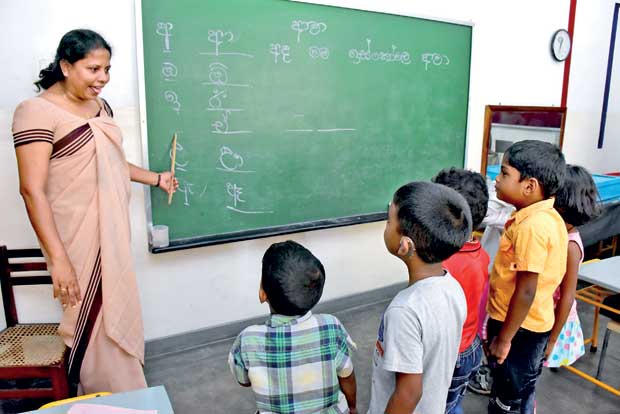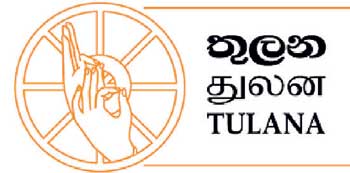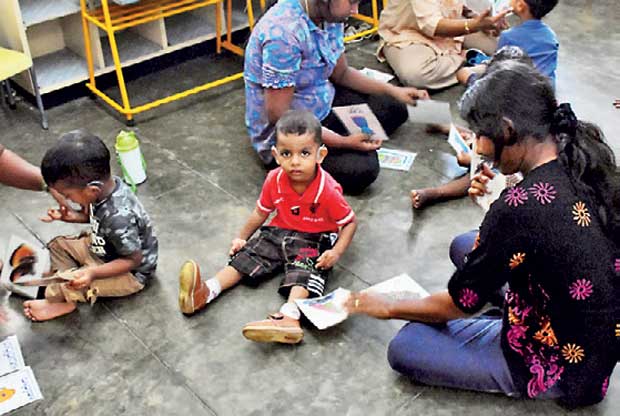Reply To:
Name - Reply Comment
Last Updated : 2024-04-20 00:00:00

 ive me four years to teach the children and the seed I have sown will never be uprooted” these were the words of Soviet leader Vladimir Lenin regarding children, and throughout the years, it is considered as a worldly truth for a child who is brought up in a good environment and is taught good social values and mannerisms. A proper education will never go astray.
ive me four years to teach the children and the seed I have sown will never be uprooted” these were the words of Soviet leader Vladimir Lenin regarding children, and throughout the years, it is considered as a worldly truth for a child who is brought up in a good environment and is taught good social values and mannerisms. A proper education will never go astray.
A child’s mind is full of imagination,creativity and dreams, not knowing the evil ways of the world. He/she is unassuming, innocent and genuine. Children are considered as gifts of God and it is every parents’ dream to bring up a healthy and educated child. But all children may not be that fortunate. Some maybe born with certain physical disabilities. But they do not mean the children are abnormal. We see in today’s society how these children are being labelled as physically or mentally handicapped. Wherever they go they draw attention and often receive only sympathy - instead of the understanding and acceptance they need. These children are equally talented and skilled as any other child. Children with slow learning (dis)abilities may need more time to get accustomed to the learning pattern but would be able to catch up with all the activities if directed to a proper school for the physically handicapped. Hearing impairment is one such disability. But hearing impaired children are much more advanced because of their quick learning and being able to do all activities as any other child. The traditional methods include sign language, Braille and speech therapy. The number of visually and hearing impaired students in Universities has increased due to successful training and some tend to do higher studies and even hold responsible positions in their workplaces.
The Daily Mirror had the opportunity of visiting the Centre for Education of Hearing Impaired Children (CEHIC) at Dalugama in Kelaniya. It is located in a calm and quiet area and away from the hustle and bustle of the city. The School’s surroundings and classrooms reminds one of the schools mentioned in the book, “Totto Chan – The little girl at the window” written by the Japanese Television personality and UNICEF Goodwill Ambassador, Tetsuko  Kuroyanagi.This was translated into Sinhala later. The book is based on the values of the unconventional education that Kuroyanagi received at Tomoe Gakusen, a Tokyo elementary school founded by educator Sosuku Kobayashi. It conveys the message, apart from the educational values, social values and mannerisms too count in a child’s behaviour. We had an interesting discussion with Rev. Sister Greta Nalawatte, the Founder and Directress CEHIC set up in 1982. Around 75 hearing impaired children are being trained under her guidance and a dedicated teaching staff. She had the brainchild of starting this amazing project at a time when hearing impaired children were isolated and often neglected, as ‘deaf and dumb’. A friendly and a dynamic nun with a charming smile, spoke to us on how she started a school which was of an international standard, completely free of charge, having all the necessary equipment with the latest teaching methods.
Kuroyanagi.This was translated into Sinhala later. The book is based on the values of the unconventional education that Kuroyanagi received at Tomoe Gakusen, a Tokyo elementary school founded by educator Sosuku Kobayashi. It conveys the message, apart from the educational values, social values and mannerisms too count in a child’s behaviour. We had an interesting discussion with Rev. Sister Greta Nalawatte, the Founder and Directress CEHIC set up in 1982. Around 75 hearing impaired children are being trained under her guidance and a dedicated teaching staff. She had the brainchild of starting this amazing project at a time when hearing impaired children were isolated and often neglected, as ‘deaf and dumb’. A friendly and a dynamic nun with a charming smile, spoke to us on how she started a school which was of an international standard, completely free of charge, having all the necessary equipment with the latest teaching methods.
Rev. Sister Greta said, “to label a child with hearing impairment as “handicapped” or “abnormal” is an injustice. Being hearing impaired or “hearing challenged” does not mean that a child is backward. These children are intelligent, with a variety of talents and they have the potential to achieve great things. None of us is perfect. Until we die, we all perhaps try to achieve perfection and personal fulfilment. Like us, a hearing impaired child is ‘potentially’ perfect.”
The school itself is a pleasure to visit because of its beautiful surroundings and interior, well maintained garden and the spick and span class rooms, laboratories, library, music room,  art room and other units. This is perhaps the only pre-school which has all the modern facilities - both technical and educational - modern methods of teaching, learning and extracurricular activities. It has 10 children between the age group of 8 months and 2 years in its Early Intervention Programme. One parent, usually the mother, sits with the child in the classroom and learns the teaching techniques alongside the child. The school has classes up to grade five. In its 33-year history, more than 560 hearing impaired children from the CEHIC have been integrated to the mainstream educational system through various schools throughout Sri Lanka. The integrated children who live within a reasonable travelling distance attend daily classes in the afternoons. There are trained teachers who teach subjects such as Mathematics, Science, Social Studies, Sinhala, English or Tamil from year One onwards. The CEHIC students who are preparing for their O/Level and A/Level exams are given extra help during weekends apart from their regular weekly afternoon classes. And above all, the children and their parents are taught about cleanliness and to care for their Centre, it’s premises, grounds and equipment.
art room and other units. This is perhaps the only pre-school which has all the modern facilities - both technical and educational - modern methods of teaching, learning and extracurricular activities. It has 10 children between the age group of 8 months and 2 years in its Early Intervention Programme. One parent, usually the mother, sits with the child in the classroom and learns the teaching techniques alongside the child. The school has classes up to grade five. In its 33-year history, more than 560 hearing impaired children from the CEHIC have been integrated to the mainstream educational system through various schools throughout Sri Lanka. The integrated children who live within a reasonable travelling distance attend daily classes in the afternoons. There are trained teachers who teach subjects such as Mathematics, Science, Social Studies, Sinhala, English or Tamil from year One onwards. The CEHIC students who are preparing for their O/Level and A/Level exams are given extra help during weekends apart from their regular weekly afternoon classes. And above all, the children and their parents are taught about cleanliness and to care for their Centre, it’s premises, grounds and equipment.
There are classes for various arts and crafts - sewing, dressmaking, cookery, carpentry, pottery, music, dancing and also a western band. The CEHIC children have also excelled in sports. The Centre’s Gymnastic team has achieved a higher status of excellence and has taken part in many national events over the years. The children are also taken on field and educational excursions occasionally. Trained teachers and experts such as reputed university lecturers, lawyers and artistes pay frequent visits to conduct programmes and workshops in their relevant subjects. Annual events such as parents’ day, children’s day and teachers’ day are held. In addition to those, festivals such as Vesak, Poson and Christmas are celebrated with friendship, harmony and devotion.
Rev. Sister Greta always had one ambition. That was to help the needy and the less privileged. She had first joined the Catholic Congregation with the Sisters of Perpetual Help. They had run the St. Joseph’s School for the hearing impaired at Ragama for more than 80 years. She qualified as a Teacher in Special Education from the Teachers’ Training College in Maharagama. At that time, the most popular method used was the sign language. Sr. Greta was searching for some other modern and experimental method instead of the traditional system. She was so disappointed with the negative response that it led her to the brink of giving up the Deaf Education field altogether.
However, the encouragement of Rev. Fr. Aloysius Pieris S.J. and Rev. Fr. Oswald Firth OMI, had made her change her mind. She reflects with a smile that without the help and guidance of Rev. Fr. Pieris this would not have been an easy task. She was fortunate to get a scholarship from Japan where she received pre-school training for hearing impaired children based on Auditory Verbal Techniques. This encouraged her to pursue further her ambition of achieving what she wanted – a new method of education for hearing impaired children and to start a pre-school.
Though she had to leave Ragama, the children’s parents had their trust in her and somehow got her a position as the teacher-in-charge of a special unit at the Kirillawala Maha Vidyalaya. Earlier it was hard to convince the parents and the area residents to send their hearing impaired children, since they were of an opinion that she had come to convert them to Christianity. However, upon the request of Ven. Silogama Vimala Thera and the Principal of Kirillawala Maha Vidyalaya A. Ranasinghe, the number of children gradually began to increase. She then realized that her dream of integrating hearing impaired children would fail unless they were given a better pre-school training. She searched for a suitable place to start her school and a good Samaritan lady in the area donated her dilapidated house at Ranmuthugala, closer to the Kirillawala Govt school. This later expanded, and since the recruitment of staff and students increased, she moved to Kelaniya where a Muslim parent donated a share of their property at Dalugama in Kelaniya. This had adequate space to start a pre-school.
The cost of the purchase was met by MISEREOR of Germany, based on the seminal project written by Rev. Fr. Firth at SEDEC in 1982. MISEREOR helped them for many years thereafter. The small school which started with a handful of children in Kirillawala has now grown into a fully equipped pre-school of a highest standard with an environment, especially built for children to learn with comfort and pleasure. There is an observation unit as well as an audiometric and hearing aid laboratory. Each child is admitted to the school after undergoing a hearing capacity test. Moreover, it adopts a special education system which no other school does to make learning a fun and joy for the children. Rev. Sr. Greta said that this pre-school produces children not only with sufficient knowledge, but also with good social manners and knowledge in cleanliness and personal hygiene. She says it is a must for the parent to work with the child, so that he/she too would gain some confidence and knowledge of how to bring up the child and groom him/her to be a disciplined citizen. The teachers are trained by Rev. Sister Greta herself under one-year probationary basis. Volunteers could help but they are not appointed as teachers because it is difficult to run on volunteers’ involvement alone, as this is an educational institute where much time and dedication are needed.
Rev. Sr. Greta says these children lack communication and language skills and are not in anyway mentally disabled. The teachers and parents have to play an important role to get this task ahead. Since the technology is more advanced, the teaching methods have become much easier. The institution also conducts training programmes for university students who have their practical training sessions in speech therapy. The parents are giving their fullest support. There are CEHIC integrated students who study at prestigious schools all over the island. This is the only pre-school in Sri Lanka which uses the latest and scientific teaching methods apart from the traditional methods such as sign language. She says there are pre-schools that have mushroomed in every nook and corner. But they do not conduct proper teaching methods and they are only concerned about gaining profits. Everyone has a duty to perform in our school as this is a community school as well. Thus the concept of working as one family has been established. Sr. Greta said with a smile, “if there is a good hearing aid and an intelligent mother, the child can go a long way”, which means that the mother should have some knowledge, be creative and should be intelligent enough to learn and absorb the methods to guide the child.

According to Rev. Sister Greta, the main cause for the children being handicapped are blood relationship marriages. For example, marrying first cousins. And some are chronic. If the blood groups do not agree with each other, the couple is prone to bear a handicapped child. The mother should be very careful within the first three months of pregnancy. Bringing up a child is not an easy task without prior knowledge. But she says if a child is brought up properly, and if the parents have the knowledge and preparation, they can give a lovely child to the world, and the child could be groomed to be a good citizen. From their younger days, the CEHIC children are taught to be disciplined and to be clean. So even if a CEHIC child goes to another school after completing five years, he/she would bear special qualities better than the other children who are more knowledgable and disciplined. It was a pleasure to see the children greet us saying ‘ayubowan’ as we went to each classroom.
Rev. Sister Greta thinks that Sri Lanka has not focused enough on special needs education and does not adopt new training methods as done in countries which are more technically advanced. Those who have a love for this field could join us and the purpose should not be earning money. Before recruiting a child to the school she says “We need to console the mother and convince her to train the child. They need a lot of counselling. When they come here for the first time, they are disheartened. But they have to accept the truth and make up their minds. If the parents are intelligent and the child is also creative, there is nothing they cannot do.
The CEHIC has a Board of Trustees, an educational board, and a management board all run by parents. The patrons include Ven. Welamitiyawe Kusaladhamma Thera, Rev. Sister Greta and Rev. Father Pieris SJ. It also includes Prof. Sarath Amunugama, vice chancellor of the Kelaniya University.
The school is run mostly by donors, and it is a community school, neither a private institution nor a state-owned school. Rev. Sister Greta also has an aspiration of expanding the school in other areas of Sri Lanka. Reflecting on the journey she has come through, she is happy and content and hope to continue with her mission. We spoke to some of the parents and teachers of how they find the development of their children then and now.
Ms. Kumarage from Wanawasala in Kelaniya said that her child joined the school in 2013 and finds it highly successful. “It is amazing. The child speaks to a considerable extent. And I feel so confident and happy about sending my child to this school. This is the only school in Sri Lanka which has modern learning methods.
Ruth Nayomi of Kirimatiyagara in Mahara has two children who are hearing impaired. One is 4 years old and the other 11. “My son can speak and there is a big difference. Before we found this school, I had no idea of how to educate my child. I was at a loss. The hospital said he had a big hearing loss but directed me to this school. Rev. Sister Greta made a huge dedication to bring him up to at least this level”.
Paba from Bogawantalawa, says that she currently lives in Kiribathgoda. “I came to know about this school from my husband, he sold tickets to do our child’s surgery. During that time, a relative of a person who works at this school told my husband about this institution. We have been here for three years. I am so happy about my child’s progress. He could not even walk properly, but now at least he can speak to a certain extent. There is no other school in Sri Lanka like this. Only God can create a school like this,” was her emotional response.
Lakshman Perera works as the audiometrician of the school and says it is not something which can be bought for money. “I came here after seeing an advertisement in the papers recruiting new teachers from the science stream. I am the only one who is still remaining out of all six recruits. When I first came here, most of these buildings were not there. I have been here for 23 years. I am also working as an acting Principal for the school. I am also in-charge of conducting special occasions and festivals. This school is so special because it does not adopt traditional methods such as sign language. I gained a lot of self satisfaction by making my contribution to this institution, which is something money can never buy”.
Noel Kariyawasam is the administrator of the school. He tells us the reason as to why he left a responsible job with an audit firm and joined as an administrator here. “This school trains those children who lack in speech and communication skills and train them to speak to a considerable level. The parents who send their children here leave very happily after 5 years. Children from distant places come here. Some parents have given up their jobs to come here. Some are even engaged in minor work. That is worth more than money. The school lacks funds and is run with greatest difficulty. But we somehow manage”.
The THULANA Research Centre for Encounter and Dialogue is considered as the “heart” of the CEHIC, since everything is administered from there and is sailing under the guidance and blessings of Rev. Fr. Pieris. THULANA was founded by him. He is a leading Asian Jesuit Liberation Theologian and also a Buddhist Scholar. The Centre was established after he witnessed the series of events that led to Marxist-inspired youth insurrection of 1971 in Sri Lanka. He had initiated an apostolate which has responded to two challenges – the challenge of the spirituality and philosophy of Sri Lanka’s major religion, Buddhism, and the challenge of the socio-political aspirations of the educated but marginalized rural youth. The name Tulana has its roots in the Sanksrit word for discernment. The Centre is a combination of a mini-university, a house for retreat and reflection, a centre for social animation, a forum for inter religious dialogue (mainly Buddhist and Christian) a place for various cultural expressions and exchanges (including Arts, music, film and video), a seat for theological renewal, and a venue for the peripheral people in all walks of life to meet and share experiences in a climate of mutual support. The institution is situated in a peaceful and a remote area at Gonawala in Kelaniya facing a paddy field. The surroundings clearly express the Catholic priest’s love for nature and its amazing natural habitat. He came here in 1974 and there were only a few inhabitants. But gradually with time, the number of inhabitants began to increase. He found it as a very convenient place and suited his taste. Doing justice to its name, the institution has spread through a vast area of trees, plants, flowers and to the constant chirping of birds could be heard the whole day, which is ideal for recreation and soothes the mind. Which is also ideal for meditation. It is amazing as how he turned out a normal compound into a research centre which is blessed with a well. Even the interior matches with the colours of the nature. Rev. Fr. Pieris says, “We learn art from nature”.
Seminars and workshops are conducted regularly at the centre and its members are involved in grassroots animation work with landless and other dispossessed persons such as those affected by environmental destruction and marginalized the globalization process. Artistic activity is also on the Tulana programme and the centre houses a collection of art reflecting its ethos created by some of Sri Lanka’s leading painters and sculptors. The use of film, video and radio in its ongoing programme of encounter and dialogue began a few years ago with the arrival of its newest permanent member Robert Cruz in 1995. The gentle and soft spoken priest spared some of his time too. He said the CEHIC had a long history and that he helped Rev. Sister Greta to start up the school to liberate these children from being cornered and criticized. The organisations that are ready to help them cannot believe that they are doing all their services for free. He thinks that new methods should be included to the school curriculum.
Earlier Rev. Fr. Pieris recollects that they used to have meetings, such as parents meetings inside the hall. There are libraries that had books of every category, Literature, Philosophy etc. Rev. Fr. Pieris invented the research Centre at a time when he was invited to go to Rome to continue with his theological duties. But he preferred to remain in Sri Lanka. The priest is also an examiner and a University Professor. “Politicians just visit, praise the place and go, but nothing happens more than that. That is not enough. More attention and assistance are needed from the relevant authorities,” laments Fr. Pieris.
It was an enjoyable and pleasant time that we spent at the CEHIC and the Tulana Research Centre, walking through the buildings and the artistic surroundings enriched with lovely paintings and sculptures. We gathered a lot of information about the social and charity work which they do with great difficulty. But yet, it is a joy for them to see the happy and innocent faces of the children in the school and the contentment of the parents which is considered the greatest profit they could make.

Add comment
Comments will be edited (grammar, spelling and slang) and authorized at the discretion of Daily Mirror online. The website also has the right not to publish selected comments.
Reply To:
Name - Reply Comment
On March 26, a couple arriving from Thailand was arrested with 88 live animal
According to villagers from Naula-Moragolla out of 105 families 80 can afford
Is the situation in Sri Lanka so grim that locals harbour hope that they coul
A recent post on social media revealed that three purple-faced langurs near t